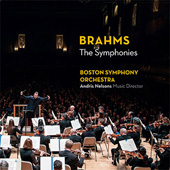


These few notes above are from the opening motif of the third movement of the Symphony No. 3 in F, Opus 90 by Johannes Brahms (1833-
1897). If someone asked me to best describe the music of Brahms, this is the segment of music I would choose as a prime example of this composer's outlook. Lyrical, longing, yearning, and with
a strong nostalgic gaze towards the past, yet simple and straightforward, and devoid of unnecessary fluff. "If we discount what he imitates, what he borrows from the great old or exotic modern styles, what remains as his most personal is his longing." {Friedrich
Nietzsche}. While most composers during the second half of the 19th century were looking to step out of music's comfort zone in order to express new and different musical ideas and
concepts, Johannes Brahms was more than content with sitting in his old, worn out chair. Not to say that he was satisfied with the status quo. He greatly expanded on what was there, and basically
reconstructed the existing forms to fit within his creative boundaries. His symphonies are much more cohesive four-movement structures when compared to Beethoven's. Traces of hard work at
connecting all the dots are often manifest, because his writing was always planned with circumspection. The bold and stately First, the lyrical and uplifting Second, the yearning and melancholy
Third, and the autumnal Fourth. A very natural progression indeed but then Brahms' work was so consistent and firm, that any of these are chronologically interchangeable, as they all bear the
same stamp of intellectual integrity.
This new recording of all four symphonies by the Boston Symphony Orchestra released on their own in-house BSO Classics label, was captured live during
concerts in November 2016. Conductor Andris Nelsons proves himself to be a versatile conductor as his approach to the music of Brahms is just as convincing as his gripping
recent award-winning accounts of Shostakovich symphonies reviewed (here) and (here).
He delineates each individual movement of each symphony with insightful precision and in doing so reveals each symphony's unique and deeply personal character. His control on the dynamic balance of the
orchestral forces is such that in some of the long, soft and sustained concluding chords for example, you can clearly hear the separation between the woodwind, string and brass instruments, and
distinguish the individual notes that the chords are built upon. His use of generally slightly slower tempos (à la old-school) allows the music to breathe and unfurl naturally. And of course the BSO
musicians, and most notably the strings, shape and express the flow of the music's narrative in a way that well projects the composer's intent at all times.
The recorded sound, engineered by the same in-house team that produced the BSO's recent Shostakovich recordings on Deutsche Grammophon, is big, open and rich, with a wide dynamic range
that serves the dense textures of the music of Brahms very well. Strongly recommended!
Jean-Yves Duperron - May 2017